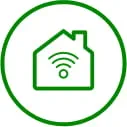Do you have a smartphone? A laptop? How about a security camera or two? A Fitbit? A Ring doorbell, a Nest thermostat, an Alexa, a couple of iPads or Kindles and a Roku? When you add it all up, you may have dozens of devices and appliances that rely on the internet and connect to your phone and computer—and one another.
This is known as "smart home" technology and the "Internet of Things (IoT)." Our homes are getting more connected to the internet every year, and there's no sign of this trend slowing down.
Even mundane appliances, like refrigerators and washing machines, are coming onto the market with WiFi connectivity under the pretense that they will optimize energy efficiency and help you streamline daily tasks. How much smart home technology you want depends on your needs and interests. For some people, it might be pretty cool to tell Google to turn the lights off. For others, it might seem silly.
Even if you're only somewhat connected or even a self-declared technophobe, you can't totally escape the reality of connectivity in the modern era. If you find yourself taking advantage of smart home tech, you may find a need for faster internet speeds and better overall connectivity optimization.
This is where fiber internet stands out. Fiber internet is becoming a critical asset for home connectivity, thanks to its fast symmetrical speeds and reliable connectivity. As our lives get even more connected, our internet is going to have to keep up. Here's why fiber internet is a future-proof solution and necessary for the continued evolution of smart home technology.
The benefits of smart home technology
Key components of a smart home system include:
- Smart hubs—these serve as the central control unit for the entire smart home system. They allow users to connect and control multiple devices from a single platform.
- Smart appliances—household appliances, such as thermostats, lighting systems, security cameras and kitchen appliances, that can be controlled remotely.
- Smart assistants—voice-activated devices, like Amazon Echo or Alexa, provide hands-free control over various smart home devices through voice commands.
- Smart sensors—these detect changes in the environment and trigger corresponding actions. For example, motion sensors can turn on lights when someone enters a room.
Why fiber internet is better for smart home technology
As you can imagine, all these devices—or even a few—can eat up bandwidth and blow through data caps, not to mention slow down the overall home connection when they're all in use.
These concerns vanish with fiber internet, which is faster and more reliable than cable or DSL.
Speed
One of the primary advantages of fiber internet is its unparalleled speed. Traditional broadband connections, such as DSL and cable, simply can't match the crazy fast speeds offered by fiber optics. Fiber internet also provides symmetrical speeds, which means upload speeds are as fast as download speeds. Traditional internet connections have much slower upload speeds due to the fact that the technology was built for a one-way transmission into the home.
Fiber internet companies, like Ziply Fiber, offer a range of speed tiers into the multi-gig range. Internet speeds of just 1 gig (1,000 Mbps) upload/download will handily carry most of a home's smart tech. Super-connected speed lovers may want to invest in multi-gig speeds—at Ziply Fiber, you can go as high as 50 Gig—the fastest home internet speed in America.
Read more: Is Ziply Fiber really the fastest internet provider in America?
Reliability and consistency
Unlike copper-based connections that may suffer from signal degradation over long distances, fiber-optics maintain signal strength over considerable distances. This reliability ensures that smart home devices can operate seamlessly without interruption, providing users with a consistent and dependable experience. The fiber-optic technology itself is newer and stronger and less subject to system failure.
Read more: A brief history of fiber internet and why it matters now
Bandwidth for multiple devices
Fiber internet comes with a dedicated connection to the home. This means that your internet doesn't slow down because you're not sharing it with the neighborhood. (If you've noticed that your internet slows to a crawl at certain times of the day, this is probably the culprit.) Fiber internet's dedicated connection and ability to handle large amounts of data make it ideal for a multi-device connected home because speeds remain consistent.
Read more: Speed vs. bandwidth: what's the difference?
Low latency for real-time control
Latency refers to the delay in data transmission. The faster the internet speed, the lower the latency should be. With fiber, you're going to get low latency, which makes it easier to work on connected devices in real time. What good is a smart security camera that has a delay? Fiber internet's minimal latency ensures that commands are executed promptly, providing users with a responsive and seamless experience.
Security
Fiber internet seamlessly integrates with smart home security protocols to provide a comprehensive and secure ecosystem for your smart devices. It supports advanced encryption and authentication methods, ensuring that your data remains private and protected. Additionally, fiber internet's low latency and high bandwidth enable quick and efficient communication between your security devices, enhancing the overall performance and responsiveness of your smart home security system.
Future-proofing your home
Investing in fiber internet is a forward-thinking decision, what we call "future-proofing." As smart home technology continues to advance, the demand for higher bandwidth will only increase. Fiber internet, with its scalability and ability to accommodate future technologies, ensures that your home remains at the cutting edge of innovation.
Read more: How fiber internet can boost property value
Fiber-optic deployment and the big picture
With the increasing number of smart devices available on the market and the direction of the world toward more connectivity, it's important to have an internet connection that can handle the demand. Fiber internet provides the bandwidth and speed necessary to seamlessly integrate future devices into your smart home ecosystem.
Fiber internet's power far exceeds the level of IoT/smart home technology that people are using now, but as smart tech integration continues and grows, we are going to need to be ready for it. As industries, businesses and cities embrace more advanced levels of connectivity for streamlined services, faster productivity and enhanced safety and operations, speed and bandwidth will need to keep up. Homes and offices, not to mention regional governments, that adopt fiber-optic internet will be more equipped to deal with IoT as it increasingly expands to more levels of daily life.






